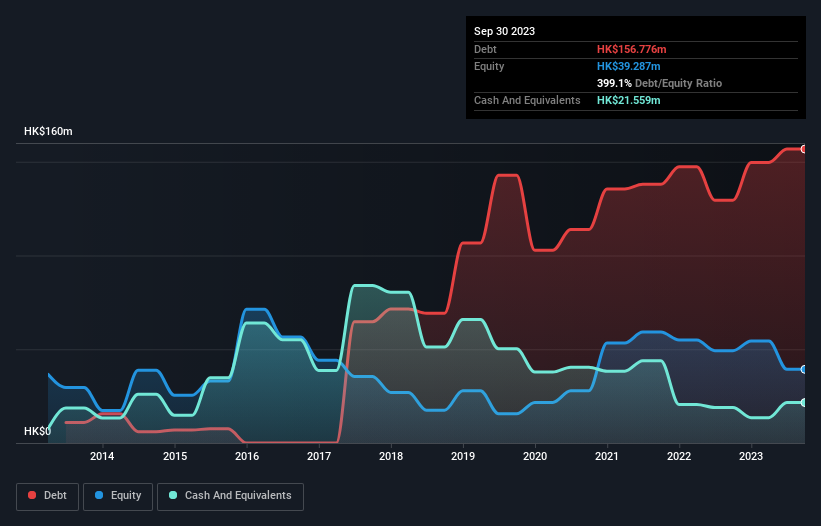Would Central Development Holdings (HKG:475) Be Better Off With Less Debt?
Warren Buffett famously said, 'Volatility is far from synonymous with risk.' When we think about how risky a company is, we always like to look at its use of debt, since debt overload can lead to ruin. We can see that Central Development Holdings Limited (HKG:475) does use debt in its business. But the real question is whether this debt is making the company risky.
When Is Debt Dangerous?
Debt and other liabilities become risky for a business when it cannot easily fulfill those obligations, either with free cash flow or by raising capital at an attractive price. Ultimately, if the company can't fulfill its legal obligations to repay debt, shareholders could walk away with nothing. However, a more common (but still painful) scenario is that it has to raise new equity capital at a low price, thus permanently diluting shareholders. Of course, debt can be an important tool in businesses, particularly capital heavy businesses. The first thing to do when considering how much debt a business uses is to look at its cash and debt together.
View our latest analysis for Central Development Holdings
How Much Debt Does Central Development Holdings Carry?
The image below, which you can click on for greater detail, shows that at September 2023 Central Development Holdings had debt of HK$156.8m, up from HK$129.5m in one year. On the flip side, it has HK$21.6m in cash leading to net debt of about HK$135.2m.

How Strong Is Central Development Holdings' Balance Sheet?
According to the last reported balance sheet, Central Development Holdings had liabilities of HK$39.4m due within 12 months, and liabilities of HK$180.6m due beyond 12 months. On the other hand, it had cash of HK$21.6m and HK$10.8m worth of receivables due within a year. So its liabilities outweigh the sum of its cash and (near-term) receivables by HK$187.7m.
This deficit is considerable relative to its market capitalization of HK$251.9m, so it does suggest shareholders should keep an eye on Central Development Holdings' use of debt. Should its lenders demand that it shore up the balance sheet, shareholders would likely face severe dilution. When analysing debt levels, the balance sheet is the obvious place to start. But it is Central Development Holdings's earnings that will influence how the balance sheet holds up in the future. So if you're keen to discover more about its earnings, it might be worth checking out this graph of its long term earnings trend.
Over 12 months, Central Development Holdings made a loss at the EBIT level, and saw its revenue drop to HK$203m, which is a fall of 21%. That makes us nervous, to say the least.
Caveat Emptor
While Central Development Holdings's falling revenue is about as heartwarming as a wet blanket, arguably its earnings before interest and tax (EBIT) loss is even less appealing. To be specific the EBIT loss came in at HK$25m. Considering that alongside the liabilities mentioned above does not give us much confidence that company should be using so much debt. So we think its balance sheet is a little strained, though not beyond repair. For example, we would not want to see a repeat of last year's loss of HK$18m. So to be blunt we do think it is risky. There's no doubt that we learn most about debt from the balance sheet. But ultimately, every company can contain risks that exist outside of the balance sheet. To that end, you should be aware of the 1 warning sign we've spotted with Central Development Holdings .
If, after all that, you're more interested in a fast growing company with a rock-solid balance sheet, then check out our list of net cash growth stocks without delay.
New: AI Stock Screener & Alerts
Our new AI Stock Screener scans the market every day to uncover opportunities.
• Dividend Powerhouses (3%+ Yield)
• Undervalued Small Caps with Insider Buying
• High growth Tech and AI Companies
Or build your own from over 50 metrics.
Have feedback on this article? Concerned about the content? Get in touch with us directly. Alternatively, email editorial-team (at) simplywallst.com.
This article by Simply Wall St is general in nature. We provide commentary based on historical data and analyst forecasts only using an unbiased methodology and our articles are not intended to be financial advice. It does not constitute a recommendation to buy or sell any stock, and does not take account of your objectives, or your financial situation. We aim to bring you long-term focused analysis driven by fundamental data. Note that our analysis may not factor in the latest price-sensitive company announcements or qualitative material. Simply Wall St has no position in any stocks mentioned.
About SEHK:475
Central Development Holdings
An investment holding company, engages in the design, manufacture, and wholesale of jewelry products in the People's Republic of China and Hong Kong.
Low risk with weak fundamentals.
Market Insights
Community Narratives




